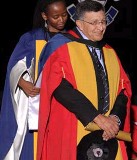
Dr Bernie Fanaroff was bestowed with an Honorary Doctorate by the Wits University early Wednesday.
The Project Director of South Africa’s Square Kilometre Array (SKA), Dr Bernie Fanaroff was bestowed with an Honorary Doctorate by the Wits University early Wednesday.
Fanaroffs academic and professional career started when he was awarded a BSc Honors in Theoretical Physics from the University of the Witwatersrand.
He then went on to complete a PhD in Radio Astronomy and Astrophysics at the University of Cambridge, in England.
“A degree in science gives you more than just knowledge of science. It gives you the skill and confidence to solve problems, not only problems in your own field, butin the wider world.
It gives you the ability to learn quickly and to understand how systems work. It gives you the skill and the confidence to be innovative, not onlyin science, but in whatever you do,” said Fanaroff.
He said young scientists and engineers can play a vital role in the SKA team which consists mostly of young South Africans.
He also holds an LLD (Honoris Causa) from Rhodes University and a D Phil (Honoris Causa) from the University of the Western Cape. He is also a Visiting Professor in Physics at Oxford University.
In the 1980s, Fanaroff played a pivotal role in the trade union movement.
In 2003, he was appointed as project director of the SA’s SKA bid that successfully resulted in South Africa being awarded the largest share of the SKA - the worldsmost powerful radio telescope.
Fanaroff said that despite all the problems facing the continent, the SKA is testimony to our greatness and what the future can hold.
“If Africa and South Africa really wants to achieve the dominant economic growth in the 21st Century as is being predicted, it has to invest in fundamental research as well.
By not doing fundamental science, we limit ourselves to always being regarded as second class citizens of the world.
The SKA has shown what we can be and achieve and that we are not second class citizens. And education plays a key role in solving our long term problems,” he commented.
He closed off with concern that South Africa has too few engineers, scientists and doctors.
sphiwem@thenewage.co.za
Article by: Sphiwe Masilela
Picture: Gordan Harris
Source: The New Age

